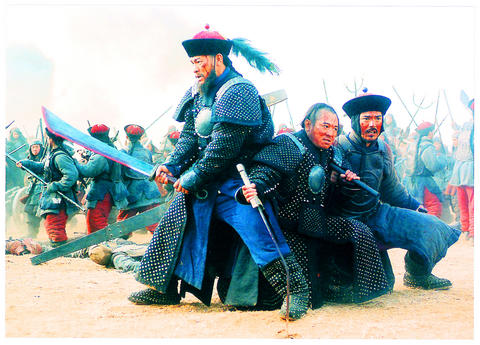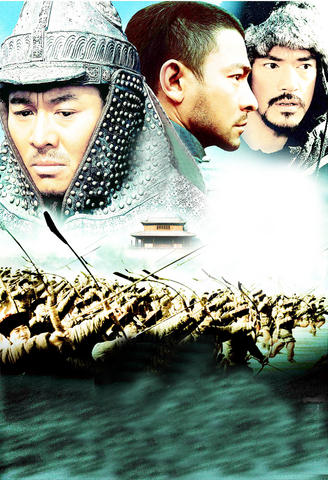Peter Chan's (陳可辛) big-budget costume drama The Warlords is something of a revelation after the succession of recent Chinese history flicks that have tried to rival Hollywood and been found wanting.
Trashy confections such as Zhang Yimou's (張藝謀) Heroes (英雄), Chen Kaige's (陳凱歌) The Promise (無極) and Stanley Tong's (唐季禮) The Myth (神話) come to mind with a shudder of shame and despair over how so much talent could be so misdirected. The Warlords is anything but perfect, but at least it remains committed to its story about brotherhood, the horrors of war and the price paid for ambition, managing to overcome its numerous lapses and hold the audience by the balls through its two-hour length. It's not always a comfortable feeling.
Loosely based on historical characters, The Warlords tells the story of General Pang Qingyun, who having lost one army after being abandoned by a rival colleague, throws in his lot with a group of bandits and uses their savagery and desperation to claw his way back into military favor. Bloody battles are fought, victories celebrated and tens of thousands of people killed. In the process, Pang abandons the few principles he ever had, betrays those closest to him to establish his position at court and is eventually assassinated. The action takes place against the background of the Taiping Rebellion (太平天國), a period of civil war that almost toppled the tottering Qing Dynasty, and during which a weak and corrupt government spent almost as much energy in internal conflict as it did trying to suppress the rebel movement.

PHOTO: COURTESY OF ARM ENTERTAINMENT
In The Warlords, Chan has decided to paint on a big canvas, with much of the action taking place in China's stark and forbidding hinterlands. Starvation, willful destruction, rape and rapine are all part of the daily currency of life. The hideousness of war and the carnage wrecked on ordinary people for the ambition of a few are both forcefully underlined. The use of screen text to note the massive scale of casualties - 20 million are estimated to have perished through famine and massacre - and the voice-over by Takeshi Kaneshiro's (金城武) character, are good old-fashioned and very unsubtle ways of making Chan's themes clear. The violence of the battle sequences is sometimes breathtaking, and Chan manages to convey the ecstatic blood lust of his main characters - the smell of success is the smell of the enemies' blood and hacked off limbs - without glorifying the conflict. Graphic scenes of mutilation and the mass execution of unarmed prisoners are not for weak stomachs, though Chan relies more on his audience's imagination than buckets of gore. Indeed, the washed out, almost monochrome palette, reminiscent of the battle sequences in Flags of Our Fathers and Letters From Iwo Jima, gives the film an impressively harsh and gritty look, and sets up a stark contrast to the saturated colors used after the three warlords of the film's title fight their way to success.
Another theme is that of brotherhood and the harsh toll extracted on friendship by ambition. Pang and his two bandit colleagues gamble everything - their own lives and the lives of the followers. But when the hard moral decisions are faced, brotherhood begins to strained. One of the most interesting revelations from The Warlords is that Jet Li (李連杰) can actually act, and he stands up well against Andy Lau (劉德華) and Kaneshiro, emerging as the most convincing of the three. Admittedly, his role is not one that demands great subtlety, but the driving ambition and the duplicity to which it gives rise are effectively conveyed. Having done an adequate job with Fearless (霍元甲, 2006), another Chinese history flick, it is encouraging to see Li cementing his escape from what seemed an endless cycle of Asian exotics that started out with his role in Lethal Weapon 4 (1998), and followed by Romeo Must Die (2000), Kiss of the Dragon (2001), Cradle 2 Grave (2003) and most recently Rogue Assassin (2007).
With Li catering to the martial arts crowd, Lau and Kaneshiro provide the eye candy, but neither really shines. Lau, as the simple illiterate peasant who is also the voice of conscience, is rather too prone to tears, and Kaneshiro is too busy managing his boy-band good looks to really pull off his role as Jiang, who commits himself totally to the idea of "one for all and all for one," and is torn apart when the ideal comes unstuck. The only woman in the movie, Xu Jinglei (徐靜蕾) as the enigmatic Lian, gets the short end of the stick in a belated attempt to cement the loyalty of the brothers - brotherhood movie credentials don't come any clearer than that. The love triangle between Pang and Cao never really gets off the ground, but Xu manages to give mud and matted sheepskin cloaks a quite improbable sexiness - no mean feat - but it is the politics of success that really drives the movie.

PHOTO: COURTESY OF ARM ENTERTAINMENT
While the cinematography is generally excellent and the fight scenes - including a magnificently choreographed charge, first of infantry and then of cavalry into a sea of enemy troops - is gut-wrenching to watch, the script often lumbers along. There is also a rather eerie effect when rain - and there is a lot of rain - falls around the protagonists rather then on them when they are doing their close-up emotional scenes. It's as if there is an invisible shield around their faces that ensures the tears are not lost in the rain, and they get to enunciate their somewhat platitudinous sentiments without spluttering.
The Warlords takes itself seriously as a film about ideas and is as good a reprise to the conventional Hong Kong cinema staple of brotherhood as one could hope for. It's addition of a thought-provoking take on the horrors of war and the lure of gambling with the lives of others makes it outstanding, for all its faults, and with luck will steer other Chinese director away from endless efforts to remake Ang Lee's (李安) Crouching Tiger, Hidden Dragon (臥虎藏龍).

As I finally slid into the warm embrace of the hot, clifftop pool, it was a serene moment of reflection. The sound of the river reflected off the cave walls, the white of our camping lights reflected off the dark, shimmering surface of the water, and I reflected on how fortunate I was to be here. After all, the beautiful walk through narrow canyons that had brought us here had been inaccessible for five years — and will be again soon. The day had started at the Huisun Forest Area (惠蓀林場), at the end of Nantou County Route 80, north and east

Specialty sandwiches loaded with the contents of an entire charcuterie board, overflowing with sauces, creams and all manner of creative add-ons, is perhaps one of the biggest global food trends of this year. From London to New York, lines form down the block for mortadella, burrata, pistachio and more stuffed between slices of fresh sourdough, rye or focaccia. To try the trend in Taipei, Munchies Mafia is for sure the spot — could this be the best sandwich in town? Carlos from Spain and Sergio from Mexico opened this spot just seven months ago. The two met working in the

Exceptions to the rule are sometimes revealing. For a brief few years, there was an emerging ideological split between the Democratic Progressive Party (DPP) and Chinese Nationalist Party (KMT) that appeared to be pushing the DPP in a direction that would be considered more liberal, and the KMT more conservative. In the previous column, “The KMT-DPP’s bureaucrat-led developmental state” (Dec. 11, page 12), we examined how Taiwan’s democratic system developed, and how both the two main parties largely accepted a similar consensus on how Taiwan should be run domestically and did not split along the left-right lines more familiar in

This month the government ordered a one-year block of Xiaohongshu (小紅書) or Rednote, a Chinese social media platform with more than 3 million users in Taiwan. The government pointed to widespread fraud activity on the platform, along with cybersecurity failures. Officials said that they had reached out to the company and asked it to change. However, they received no response. The pro-China parties, the Chinese Nationalist Party (KMT) and Taiwan People’s Party (TPP), immediately swung into action, denouncing the ban as an attack on free speech. This “free speech” claim was then echoed by the People’s Republic of China (PRC),